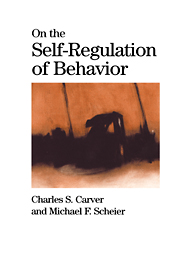Book contents
- Frontmatter
- Contents
- Preface
- Acknowledgments
- 1 Introduction and Plan
- 2 Principles of Feedback Control
- 3 Discrepancy-Reducing Feedback Processes in Behavior
- 4 Discrepancy-Enlarging Loops, and Three Further Issues
- 5 Goals and Behavior
- 6 Goals, Hierarchicality, and Behavior: Further Issues
- 7 Public and Private Aspects of the Self
- 8 Control Processes and Affect
- 9 Affect: Issues and Comparisons
- 10 Expectancies and Disengagement
- 11 Disengagement: Issues and Comparisons
- 12 Applications to Problems in Living
- 13 Hierarchicality and Problems in Living
- 14 Chaos and Dynamic Systems
- 15 Catastrophe Theory
- 16 Further Applications to Problems in Living
- 17 Is Behavior Controlled or Does It Emerge?
- 18 Goal Engagement, Life, and Death
- References
- Name Index
- Subject Index
11 - Disengagement: Issues and Comparisons
Published online by Cambridge University Press: 05 June 2012
- Frontmatter
- Contents
- Preface
- Acknowledgments
- 1 Introduction and Plan
- 2 Principles of Feedback Control
- 3 Discrepancy-Reducing Feedback Processes in Behavior
- 4 Discrepancy-Enlarging Loops, and Three Further Issues
- 5 Goals and Behavior
- 6 Goals, Hierarchicality, and Behavior: Further Issues
- 7 Public and Private Aspects of the Self
- 8 Control Processes and Affect
- 9 Affect: Issues and Comparisons
- 10 Expectancies and Disengagement
- 11 Disengagement: Issues and Comparisons
- 12 Applications to Problems in Living
- 13 Hierarchicality and Problems in Living
- 14 Chaos and Dynamic Systems
- 15 Catastrophe Theory
- 16 Further Applications to Problems in Living
- 17 Is Behavior Controlled or Does It Emerge?
- 18 Goal Engagement, Life, and Death
- References
- Name Index
- Subject Index
Summary
If I can't win, I won't run.
(Chariots of Fire)Chapter 10 described a division between two classes of responses to difficulty in moving toward goals. A sense of confidence leads to renewed effort, and a sense of doubt leads to giving up. These classes of response are both integral parts of the system of self-regulation that keeps people adapted to the world.
Once again, the conceptualization raises questions and issues. Some of them concern disengagement as an event: what it is, alternative ways to view it, whether in fact disengagement per se actually occurs. Other issues arise in considering how this theory relates to other models of the phenomena under discussion. Another point concerns the fact that issues of engagement and disengagement arise in many literatures, some quite unexpectedly.
SCALING BACK GOALS
AS LIMITED DISENGAGEMENT
By now we've described several variations on the theme of disengagement: diminishing effort, leaving the behavioral context, mental disengagement (daydreaming and off-task thinking), and the bind between having the impetus to disengage and being unable to express it.
In this section we consider another potential reflection of disengagement. Sometimes progress toward a goal is going poorly, expectancies of success are dim, and you want to quit. Rather than quit altogether, you trade this goal for a less demanding one – a kind of limited disengagement. You've given up on the first goal at the same time as you're adopting a lesser one (cf. Miller et al., 1960, p. 171).
- Type
- Chapter
- Information
- On the Self-Regulation of Behavior , pp. 190 - 216Publisher: Cambridge University PressPrint publication year: 1998



